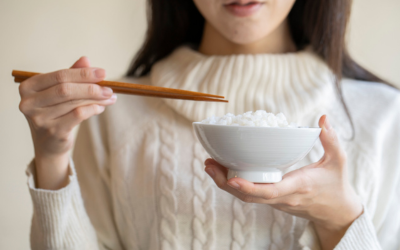Can Leaving Rice or Pasta Out Overnight Lead to Food Poisoning?
You probably wouldn’t leave a hamburger sitting out overnight. But did you know leaving rice or cold pasta out for an extended period can be just as hazardous? A recent viral TikTok brought attention to this less-discussed form of food poisoning known as fried rice syndrome. Fried rice syndrome is caused by a bacterium called Bacillus cereus, which is present in these types of starchy foods prior to cooking. Bacillus cereus is a heat-resistant bacteria, so even recooking foods that have not been appropriately refrigerated can result in food poisoning.

Are you inadvertently taking risks with your eating habits? Here are four common eating habits that could compromise your health—and ruin your weekend.
Eating food that's sat out for a while
This depends on what “a while” means and the conditions. Anything perishable should go into the fridge within two hours. If perishables are sitting in temperatures of more than 90 °F, the time limit to get them into the fridge goes down to one hour. Examples include leftovers, boiled or fried rice, pasta salad, cut fruit, and poultry, meat and seafood. Bacteria tends to grow rapidly in the “danger zone,” between 40 °F and 140 °F.
Eating foods that have been in the refrigerator too long
Foods that are left in the refrigerator for too long have increased bacteria growth and increased risk of food poisoning. Cook or freeze fresh poultry, fish, ground meats and variety meats within two days; other beef, veal, lamb, or pork, within three to five days. Most other leftovers should be eaten within three to four days.
Munching on cold or lukewarm leftovers
Cold pizza isn’t the best way to go. Even classic leftovers should be reheated to at least 165 °F. Proper storage and thawing, if the food was frozen, is important, too.
Not cooking foods to safe minimum temperatures
It is important to cook foods to a safe minimum temperature to prevent food poisoning illnesses. This can be done using a food thermometer before removing the food from the heat source. For added safety and quality, allow meats to rest for at least three minutes before serving.
- Cook raw beef, pork, lamb and veal steaks, chops and roasts to 145°F.
- Cook raw ground beef, pork, lamb and veal to 160°F.
- Cook egg dishes to 160°F.
- Cook fish to 145°F.
- Cook raw poultry to 165°F.
For more information about foods safety guidelines, visit the United States Department of Agriculture (USDA): Food Safety | Food Safety and Inspection Service (usda.gov)









